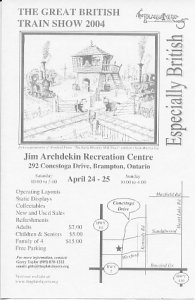The Great British Train Show will be held in Brampton, Ontario on April 24-25, 2004.
Exclusively British trains (and buses), liberally interpreted. Scales from 2mm up. Layouts, displays and dealers.
More details at the Platelayers website.
Exclusively British trains (and buses), liberally interpreted. Scales from 2mm up. Layouts, displays and dealers.
More details at the Platelayers website.



